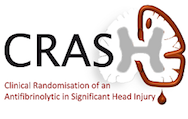Severely bleeding patients must receive lifesaving drug within minutes not hours
-
-
- Every minute counts when using tranexamic acid to treat life threatening bleeding after trauma or childbirth
- Survival benefit reduced by 10% for every 15 minutes treatment delay
- TXA should be given by paramedics at scene and at the onset of postpartum haemorrhage
Major bleeds must be treated with tranexamic acid (TXA) as fast as possible since deaths occur quickly and the drug’s life-saving benefits diminish with each passing minute. This is the conclusion of an IPD meta-analysis published in The Lancet in October 2017. The study built on evidence from two large-scale international randomised trials looking at the effect of tranexamic acid in life threatening bleeding. The WOMAN trial (2017), which involved 20,000 women with postpartum haemorrhage, and the CRASH-2 trial (2010) - a trial of 20,000 trauma patients. Both trials showed that tranexamic acid reduces death due to bleeding by a third when given within three hours. However, analysing data from 40,138 patients from the two trials combined, this new study found that treatment must be given within minutes rather than hours. Immediate treatment with tranexamic acid improved bleeding survival by 70% but thereafter the survival benefit decreases by 10% for every 15 minutes’ delay until three hours, after which there was no benefit. These results have important implications for the CRASH-3 trial. We know that bleeding into the brain occurs soon after injury and we have every reason to believe TXA will be more effective when given soon after injury.
It is essential that we do not miss an early benefit from TXA in TBI therefore reducing time to treatment is critical.
-

